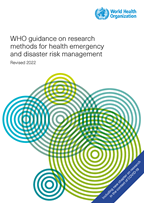- Home/
- Our Work/
- Health Emergencies/
- Research Methods/
- Sections and chapters/
- Section 3: Determining the scope of your study/
- Chapter 3.6 Assessing the problem and developing a scoping review
Section 3: Determining the scope of your study
Chapter 3.6 Assessing the problem and developing a scoping review

Research Methods for Health EDRM
Section navigation
- Section 3: Determining the scope of your study
- Chapter 3.6 Assessing the problem and developing a scoping review
- Chapter 3.1 Asset mapping to consider outcome measurement and stakeholder engagement
- Chapter 3.2 Disaster risk factors – hazards, exposure and vulnerability
- Chapter 3.3 Designing a research intervention for Health EDRM
- Chapter 3.4 Ethics in research
- Chapter 3.5 Determining the research question
- Chapter 3.7 Research resources to support policy and new research
Affun-Adegbulu C, Ardalan A.
Chapter 3.6 describes the role of scoping reviews when planning research in health emergency and disaster risk management (Health EDRM), including:
- Scoping reviews as a research methodology.
- Application of the methodology, including the steps involved and reporting of findings.
- Tools that facilitate the scoping review process.
What is this chapter about?
Decisions about new Health EDRM research should be based on an understanding of the evidence that is already available. Scoping reviews can help decision-makers and researchers to examine the extent, range and nature of research activity. They can help to (a) determine the likely value of undertaking a full systematic review, (b) summarize and disseminate existing research findings and (c) identify research gaps.
This chapter outlines and describes the scoping review methodology and describes how rigorously prepared scoping reviews can help in contextualizing the questions for Health EDRM research. It uses two case studies to (a) illustrate how scoping reviews have been used to assess the evidence base for disaster management in low- and middle-income countries (LMICs) and (b) identify research gaps for public health emergency preparedness.
Case studies presented in the chapter:
- Example of a scoping review of the evidence base for disaster management in LMICs.
- Example of a scoping review to inform a stakeholder consultation about research gaps for public health emergency preparedness.
What are the key messages of this chapter?
- Scoping reviews map and synthesize the available evidence in a given subject area..
- They can be used to gauge the extent, range and nature of research activity, determine the value of undertaking a more formal systematic review, identify research gaps and develop a research agenda.
- While scoping reviews differ from systematic reviews, they are not substandard systematic reviews, rather, they are a research methodology in their own right. They should therefore adhere to good research principles of transparency, validity and reproducibility.
